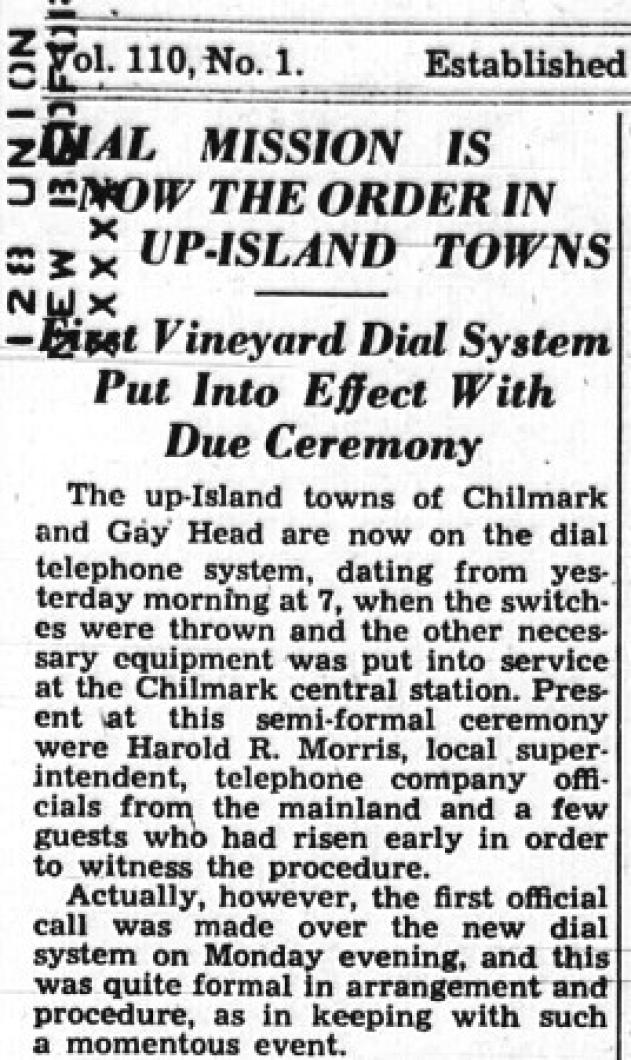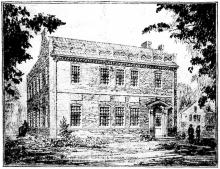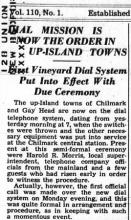The Up-Island towns of Chilmark and Gay Head are now on the dial telephone system, dating from yesterday morning at 7, when the switchers were thrown and the other necessary equipment was put into service at the Chilmark central station. Present at this semi-formal ceremony were Harold R. Morris, local superintendent, telephone company officials from the mainland and a few guests who had risen early in order to witness the procedure.
Actually, however, the first official call was made over the new dial system on Monday evening, and this was quite formal in arrangement and procedure, as in keeping with such a momentous event.
Present were Mr. Morris and other representatives of the telephone company; the board of selectmen from Chilmark; F. Roger Allen, Benjamin C. Mayhew Jr. and D. Herbert Flanders; Gay Head selectmen, Edmund Cooper, chairman, Leonard Vanderhoop, and Donald Malonson, elected chief of the tribe, with Mrs. Malonson; and Napoleon Madison, tribal medicine-man, these last being in full Indian regalia.
A Historic Call
The call was from one town office to the other, Mr. Cooper calling Mr. Allen, all of which has been recorded in pictures, which in course of time, will possess an historical value.
Taking part in the cut-over were D. Herbert Flanders and Leonard Vanderhoop, representing the respective board of selectmen of Chilmark and Gay Head, and Chester L. Brennan, veteran telephone trouble-shooter, who is retired after many years of service on the Island, but who was called back into the picture to throw the final switch, as a mark of appreciation and respect.
There was a significance in this little ceremony beyond the probable realization of anyone present. Here, assembled at the office in Chilmark, were descendants of the first white men ever to settle on Martha’s Vineyard. Present also were descendants of the original inhabitants, who had inhabited the Vineyard for untold centuries before the white men came.
Tradition states that a friendliness developed between Indian and white man almost from the beginning, and that it developed and strengthened with the passage of time, all of which is borne out by the historical record and what is common knowledge of today.
But tradition also states that in those early days when passage to and from Gay Head and the rest of the Island was on foot or by water only, communications of a sort were maintained, partly from fear of invasion of the Island by mainland tribes, and partly through the mutual interest in each other, held by Indian and white man.
And the story has many times been told that bonfires were lighted on the high up-Island hills, which conveyed a meaning to those who saw the flames and smoke. The tales have not actually indicated that smoke signaling was practiced, but the kindling of a fire at some time and place arranged was a message in and of itself and as such intelligible to those to whom in was directed.
It is a long, long step from this primitive means of communication to the present dial telephone by means of which Indian and white men continue to keep in touch with one another.

Editorial: New Day in Chilmark
Telephone progress caught up with Chilmark yesterday, or vice versa, and this up-Island community is now using dials. We suppose that the standpoint of telephone technics, dials and the old-fashioned hand-crank telephones had little or no resemblance, but from the standpoint of the rural subscriber they have this in common: the subscriber handles the operation himself, which is highly satisfactory to independent people.
In the old days the hand-crank telephone could be used to call directly any subscriber on the same line and other numbers had to be given to central. The dials are not so limited, and with them the subscriber has larger possibilities right at the tip of his fingers.
As a matter of history, the hand cranks went down-Island in 1929 when the new Vineyard Haven exchange was opened and operation was shifted to what is known as the common battery system. Up-Island the cranks stayed until 1938 and not everybody liked the change, either. Those cranks were pretty handy, and many a time when down-Island was cut off by storm, some up-Island areas kept their own telephone conversations going.
The workers of the telephone will apparently never cease. Most of us have not the remotest idea how they are all accomplished and in this respect, even today, we are a little like the West Tisbury subscriber in the early days who hesitated to hang freshly washed clothes on the telephone wire for fear they would shoot right off to Vineyard Haven, through the brush, along the roads, and cross country.











Comments